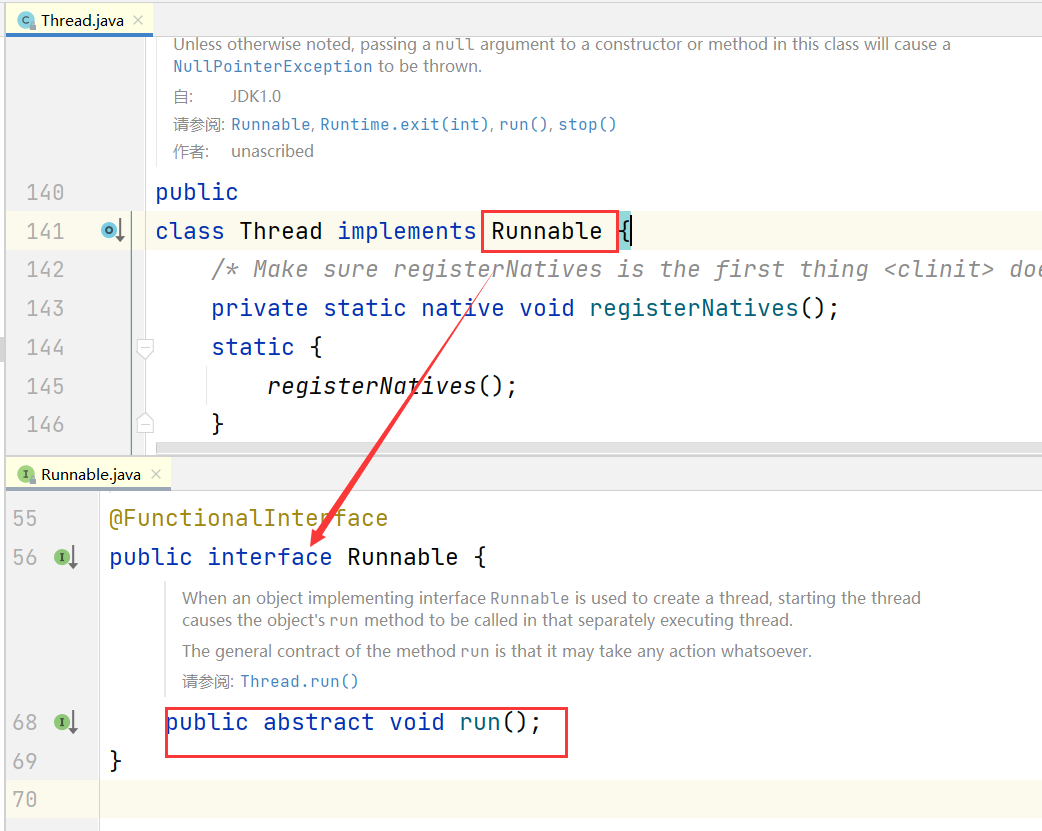Lamda expression
- λ It is the eleventh letter in the Greek alphabet, and its English name is Lambda.
- Why use lambda expressions:
1. Avoid too many anonymous inner class definitions.
2. It can make your code look very concise.
3. Remove a pile of meaningless code, leaving only the core logic. - lambda expressions are essentially functional programming concepts. Definition of functional interface:
1. Any interface that contains only one abstract method is a functional interface.
2. For functional interfaces, we can create objects of the interface through lambda expressions.
lamda expression syntax: (method parameter table) - > {method body}
Parentheses can be omitted when there is only one parameter, and braces can be omitted when there is only one statement in the function body.
Lambda expression introduces an operator - >, called lambda operator or arrow operator, into the Java language, which divides lambda into two parts:
Left: all parameters required by Lambda expression are specified
Right: the Lambda body is defined, that is, the function to be performed by the Lambda expression.
[e.g.]
We know that the Thread class inherits the Runnable interface.
View that the Runnable interface has only one abstract method run(), so the Runnable interface is a functional interface. We can create the object of the interface through lambda expression: new thread (() - > system. Out. Println ("multithreading learning"). start();

Inner class and lamda expression:
package Threads;
public class Testlambda {
//3. Static internal class
static class Like2 implements ILike {
@Override
public void lambda() {
System.out.println(" i like lambda2");
}
}
public static void main(String[] args) {
ILike like = new Like();
like.lambda();
like = new Like2();
like.lambda();
//4. Local internal class
class Like3 implements ILike {
@Override
public void lambda() {
System.out.println(" i like lambda3");
}
}
like = new Like3();
like.lambda();
//5. Anonymous inner class
like = new ILike() {
@Override
public void lambda() {
System.out.println(" i like lambda4");
}
};
like.lambda();
//6. Use lambda expression
like = ()->{ System.out.println(" i like lambda5"); };
like.lambda();
}
}
//1. Define a functional interface
interface ILike {
void lambda();
}
//2. Implementation class
class Like implements ILike {
@Override
public void lambda() {
System.out.println(" i like lambda");
}
}
Static proxy
- Why use a static proxy:
Proxy objects can do many things that cannot be done by objects; Real objects focus on doing their own things. - Static agent summary:
1. Both real objects and proxy objects should implement the same interface
2. The proxy object should represent the real role
Case: wedding company and wedding
package Threads;
public class StacticProxy {
public static void main(String[] args) {
//Deliver real objects to the agency
WeddingCompany weddingCompany = new WeddingCompany(new You());
weddingCompany.HappyMarry();
}
}
//Jointly implemented interface
interface Marry {
void HappyMarry();
}
//Real character, you get married
class You implements Marry {
@Override
public void HappyMarry() {
System.out.println("The bride and groom are married");
}
}
//Acting role to help you get married
class WeddingCompany implements Marry {
//Who to represent -- the real target role of
private Marry target;
//Constructor, transfer is really an object
public WeddingCompany(Marry target) {
this.target = target;
}
@Override
public void HappyMarry() {
before();
this.target.HappyMarry();//Real object
after();
}
//Functions implemented by agent
private void after() {
System.out.println("Agent company to clean up garbage");
}
private void before() {
System.out.println("The agent arranges the site");
}
}